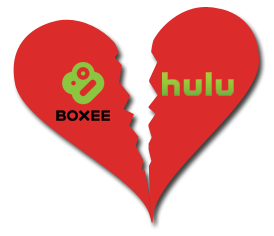
So the Wife and I have moved in to our lovely new home in Marin Country. With so much natural beauty right outside our front door, we weren't sure we'd want a TV keeping us tethered to the sofa. Then Nicole went out of town and I went to Best Buy. Enter the 32" Sony Bravia.
Towering over the room like some Kubrickian monolith, it demanded content and I complied. Only problem is, our house is down a canyon so there's no chance of Satellite TV, and I wasn't about to step into the Comcast pain-cave. So I dusted off an old PowerBook, installed Boxee and hooked that bad boy up.
Let me just say right here that Boxee rocks the house. Its interface is perfect for an across-the-room experience. It's super easy to load content. Any medium that can come down an any sort of feed - Last.fm, BBC iPlayer, NPR, Picasaweb, Flickr, YouTube - will happy play through Boxee. Think of Google Reader for your living room. 'Bliss', you'd think. And you'd be right.
And yet.
The suits at Hulu had a colossal brain fart and decided that they don't want people watching their content via Boxee. Anyone who thought that NBC and Newscorp were visionary for rolling out Hulu will be re-appraising them now. It seems that some can't get past the quaint notion of venue. Once, a spot on the dial, now a URL; by any other name venue rules the school. And if viewers would rather enjoy this content elsewhere - commercials included?
Sorry kids. Hulu doesn't deliver.
Hulu is not alone. Marketers of all stripes routinely opt for venue over volume, delivering content on their own closed servers instead of injecting it into established communities. They create "Youtube Lite" or Flickr Lite" instead of just embracing the real thing. They prefer a restricted audience in a controlled environment over a larger one that operates on its own terms. Venue trumps volume.
But for how much longer? And will it be the brands or the content aggregators (we used to call them channels) that first realize that the tide has turned?


